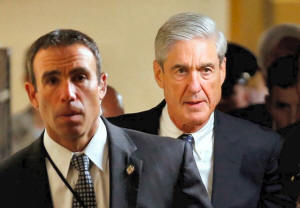|
Mueller probing Russia contacts at
Republican convention: sources
 Send a link to a friend
Send a link to a friend
 [March 30, 2018]
By Mark Hosenball [March 30, 2018]
By Mark Hosenball
WASHINGTON (Reuters) - Investigators
probing whether Donald Trump's presidential campaign colluded with
Russia have been questioning witnesses about events at the 2016
Republican National Convention, according to two sources familiar with
Special Counsel Robert Mueller's inquiries.
Mueller's team has been asking about a convention-related event attended
by both Russia's U.S. ambassador and Jeff Sessions, the first U.S.
senator to support Trump and now his attorney general, said one source,
who requested anonymity due to the ongoing investigation.
Another issue Mueller's team has been asking about is how and why
Republican Party platform language hostile to Russia was deleted from a
section of the document related to Ukraine, said another source who also
requested anonymity.
Mueller's interest in what happened at the Republican convention in
Cleveland, Ohio in July 2016, is an indication that Trump campaign
contacts and actions related to Russia remain central to the special
counsel's investigation.

Trump, who was nominated as the Republican Party candidate for the
November 2016 election during the convention, has denied any collusion
with Russia during the campaign. Moscow has denied U.S. intelligence
agencies' findings that it interfered in the campaign to try to tilt the
election in Trump's favor.
Investigators have asked detailed questions about conversations that
Sessions, then a Trump campaign adviser, had at a convention event
attended by then-Russian Ambassador to the United States Sergei Kislyak,
said the first source, who was questioned by Mueller about the event.
The same source said Mueller's team also has been asking whether
Sessions had private discussions with Kislyak on the sidelines of a
campaign speech Trump gave at Washington's Mayflower Hotel in April
2016.
Sessions' spokespersons have denied repeatedly that he had any private
discussions with Kislyak at the Mayflower. Sessions told lawmakers last
year he could not recall any conversations with Russian officials at the
hotel but could not rule out that a "brief interaction" with Kislyak may
have occurred there.
Spokespersons for Mueller and Sessions declined to comment on Mueller's
interest in Sessions' activities at the convention and other
convention-related events.
UKRAINE LANGUAGE
The special counsel's investigators have also interviewed attendees of
the committee meetings that drafted the Republican Party platform in
Cleveland.

[to top of second column]
|

Special Counsel Robert Mueller (R) departs after briefing members of
the U.S. Senate on his investigation into potential collusion
between Russia and the Trump campaign on Capitol Hill in Washington,
U.S., June 21, 2017. REUTERS/Joshua Roberts

At one committee meeting, according to people in attendance, Diana
Denman, a member of the platform committee's national security
subcommittee, proposed language calling for the United States to
supply "lethal defensive weapons to Ukraine's armed forces and
greater coordination with NATO on defense planning."
But the final platform language deleted the reference to "lethal
defensive weapons," a change that made the platform less hostile to
Russia, whose troops had invaded the Crimean peninsula and eastern
Ukraine.
After the convention, Denman told Reuters in 2016, J.D. Gordon, a
Trump foreign policy adviser, told her he was going to speak to
Trump about the language on Ukraine, and that Trump's campaign team
played a direct role in softening the platform language.
The Trump campaign has denied playing any role in the weakening of
the party's position regarding Ukraine. Gordon has called Denman's
version of events "inaccurate."
Stephen Yates, co-chair of the platform committee's national
security subcommittee, said he has "heard nothing about other
members of the subcommittee being called in for questioning, and I
have had no interaction with anyone working on the investigation."
Sessions recused himself last year from the federal probe into
Russian election meddling after it emerged that he had failed to say
during his Senate confirmation hearing to be attorney general that
he had met with Russia's ambassador in 2016.

(This version of the story corrects paragraph 8 to show Sessions did
not rule out a "brief interaction" with Kislyak instead of he
admitted to speaking briefly to Kislyak)
(Reporting By Mark Hosenball; Editing by John Walcott and Frances
Kerry)
[© 2018 Thomson Reuters. All rights
reserved.]
Copyright 2018 Reuters. All rights reserved. This material may not be published,
broadcast, rewritten or redistributed.
Thompson Reuters is solely responsible for this content. |